The Diplomat
The Foreign Ministers of Spain and Austria, Arancha González Laya and Alexander Schallenberg, defended yesterday in Vienna the European strategy for the purchase and distribution of COVID-19 vaccines, after the Austrian Federal Chancellor, Sebastian Kurz, denounced the “unequal distribution of vaccines” among the EU countries.
“There are areas where there is room for improvement” and Spain is “willing” to accept possible revisions, but “for Spain the strategy is European” because “it is the most efficient way out of the pandemic” and to ensure that “all European citizens have the same opportunities and that there are no first, second or third class citizens”, said Arancha González Laya during the joint press conference with Alexander Schallenberg.
“We develop vaccines together, we buy them together and we immunize together”, warned the minister, who also demanded that solidarity with vaccines should not be limited to Member States and should take into account third countries. It is necessary to avoid “vaccine nationalism” because “no one will be safe until everyone is safe”, she said.
For his part, Alexander Schallenberg assured that Austria is “very much in favor of acting jointly”, although “doubts arise when some Member States act differently”. “That does not mean that the common position is not the right way forward”, he warned. “Not everything is going perfectly” in the European vaccination strategy, but “this is the first time we are doing all this and in the next pandemic we will do better”, he added.
Sebastian Kurz denounced yesterday that vaccines are being unevenly distributed among the states and that some governments have even signed secret bilateral agreements with pharmaceutical companies outside the common purchases of the European Commission. This situation, according to the Chancellor, has benefited Malta, which by the end of June will have received “three times more doses per inhabitant than Bulgaria”, or the Netherlands, which will have “twice as many vaccines” as Croatia. A spokesman for the European Commission, quoted by the Europa Press agency, specified that the rules for the joint purchase of vaccines authorize the Member States to negotiate exchanges between them on the basis of the initial allocations according to the population of each country.
During yesterday’s press conference, Gonzalez Laya and Schallenberg also agreed on the defense of the vaccination certificate to save tourism, a fundamental economic sector for both countries. “The key to return to normality is the immunization passport, which we are working on in Brussels”, said the Austrian minister. “All member states should work as quickly as possible to have that passport in place, so that people can enjoy freedom again”, he added. “We strongly believe in vaccination certificates”, said González Laya, who also defended working towards this purpose “within the framework of the OECD, because there are many countries that want to exercise mobility”.
Gonzalez Laya’s day in Austria, the second stage of a European mini-tour that began on Thursday in Slovenia, included meetings with the Secretary General of the Organization for Security and Cooperation in Europe (OSCE), Helga Schmid, and with the Director General of the International Atomic Energy Agency (IAEA), Rafael Grossi.







